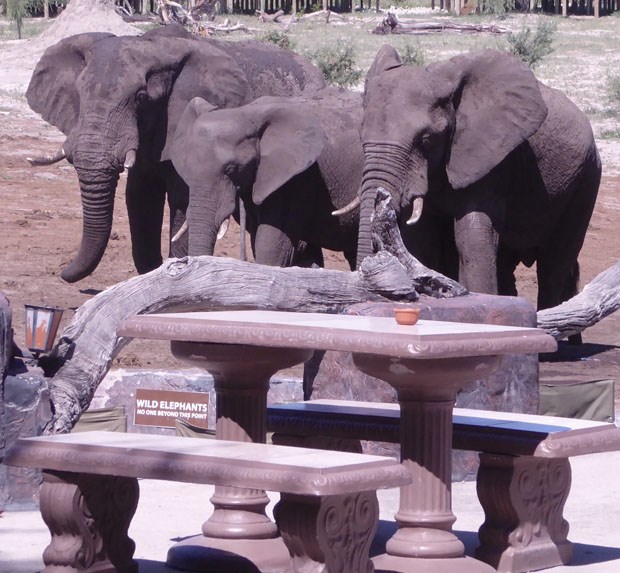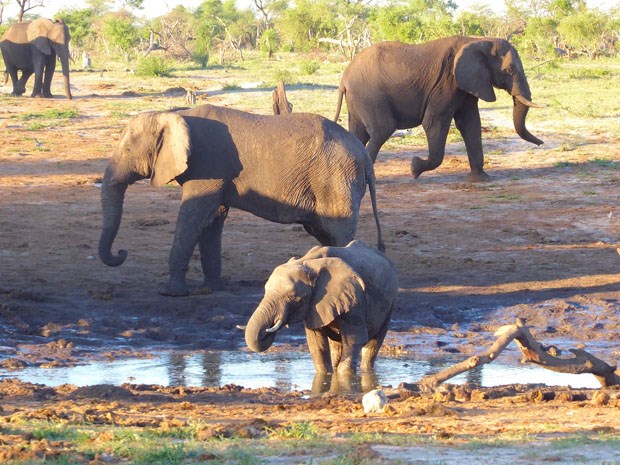Travel across Africa’s landscape, and chances are you will weep at its beauty, its contradictions and its challenges. Find yourself at Botswana’s Elephant Sands Bush Lodge, and chances are it will change your perspective on a part of the world where the qualities of nature and nurture are driving a hard bargain, especially for the African elephant.
Set in a private conservancy of 16,000 ha/4,000 acres, Elephant Sands is the passion of the Moller family, operating a small guest camp that offers safe haven and fresh water for hundreds of roaming, wild elephants. Witnessing the comings and goings of these majestic creatures is an extraordinary affair for which you get a grandstand view. By day, the elephants jostle and sway around the water source, protecting their youngsters, ignoring the zebras, and chasing off wild dogs with impressive charges, hoots and hollerin’. By night, they walk so close to your bush cabin that their passing shadows, silent and soft-footed in the sand, block out the moonlight and transport your imagination to Jurassic World. There’s good reason why no guest is permitted to leave their porch, use a flash camera or point a light – and simply never get between an elephant and its water source.
So it was that in spite of the night’s humidity, I stood frozen. The shadow on the other side of the bamboo wall had taken on visceral sound, cracking through each dried cane with deafening alacrity. My tiny flashlight bounced an eerie light off the stone floor creating shadows dancing upon shadows as the brittle slats trembled and snapped. Then, between their jagged teeth, the most enormous elephant trunk weaved and smelled its way down to the porcelain cistern and proceeded to scoop up all the water with loud abandon.

In that moment, I came to appreciate the ingenuity, desperation and plight of the African elephant.
“Toilet tanking” is not uncommon at Elephant Sands and truly illustrates how far elephants need go to satiate their 30 to 50 gallon-a-day thirst. They can smell water from some 10 miles away, whether over ground or beneath it, and will travel even further on that promise. For example, when government-run wells break down in neighbouring Zambia, skittish, poacher-wary herds will travel to the Sands. The tensions between the ‘Zed’ elephants and the more people-friendly ‘Bots’ herd is palpable, and is a part of what makes Elephant Sands so unique. Remarkable too because the raison d’etre of this modest family enterprise, a lodge comprising 14 one-room chalets set around a muddy hole, is to bring water to elephants. And bring it they do, in convoys of tanker trucks every week to the tune of US$250,000 annually. As drought conditions persist in so much of Africa, it’s an unsustainable investment, and the Moller family has established a funding legacy (Water for Elephants Trust) on various social media platforms.
In Africa, lackof water is nature’s cruelty and its progressive impact over recent years has locked much of the continent in a stranglehold of parched landscapes and diminished resources. Some of Africa’s best-known spaces such as the Botswana Wetlands, South Africa’s Krueger National Park, and Kenya’s Samburu and Meru national parks are fighting for their very existence. Wildlife is being managed and culled as vegetation withers and water pools evaporate. Poaching activity, too, has surged in recent years with cartels using sophisticated GPS tracking systems to find and target their quarry – primarily elephants and rhinos, from hit-and-run helicopters. A kilogram of rhino horn – considered an aphrodisiac in Vietnam, earned $65,000 a few years ago and is still many times far more valuable than elephant tusk.
Illegal ivory sales out of Angola, Zambia, Zimbabwe and other parts of the African continent have long provided arms for various militia, but since they also fund cash-strapped governments dealing with starved economies where unemployment is near 90%, political will towards any conservation effort is castrated before it is tabled.
Against these overwhelming odds, the Moller family at Elephant Sands has put passion before profit to water a lifeline. And they are not alone. There’s a small contingent of like-minded entrepreneurs across Africa forming some strong alliances on the world stage to support, strengthen and broaden anti-poaching regimes. Clearly, Africa’s conundrum of breath-taking beauty and hard-to-swallow economics is a global one and for my part, it’s an invitation to return to its landscapes where my footsteps, and my dollars, can be part of a solution.
Travel Writers’ Tales is an independent newspaper syndicate that offers professionally written travel articles to newspaper editors and publishers. To check out more, visit www.travelwriterstales.com



